We had to meet Lisu in secret as she says the local Nigerian authorities are trying to prevent her from talking to journalists.
She was one of the 276 girls abducted from their school in the town of Chibok exactly a decade ago - a kidnapping that shocked the world and sparked a global campaign to #BringBackOurGirls, which included former US First Lady Michelle Obama.
More than 180 have either since escaped or been freed, including Lisu, who gave birth to two children while she was a hostage of the militant Islamist group Boko Haram, living in a hideout in the Sambisa forest.
After escaping, Lisu - which is not her real name - went through the government rehabilitation programme, before being placed in group accommodation with other escapees.
"I do regret coming back," she says, shuffling in her seat.
Not exactly the message the authorities want coming out.
The Borno state government has denied limiting the former captives' freedom of speech.
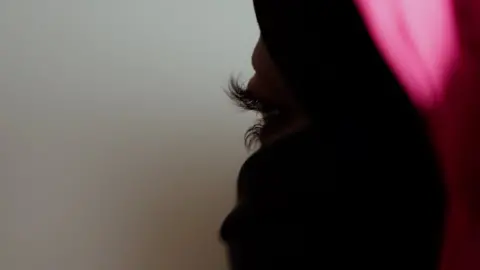 BBC/Simpa Samson. Lisu is "deeply unhappy" about the way she has been treated in the government accommodation
BBC/Simpa Samson. Lisu is "deeply unhappy" about the way she has been treated in the government accommodation
Lisu feels the way she is now treated is worse than what she lived through before.
"Sometimes I cry when I remember. I ask myself: 'Why did I even leave Sambisa to come back to Nigeria, only to come and face such degrading treatment, being insulted almost daily?' I never experienced such heartache while I was in Sambisa."
Lisu says she is barely surviving under state care; basic provisions like food and soap are not enough, her movements are closely watched and restricted by security guards and she has been subjected to verbal abuse from staff at the group home.
"They yell at us all the time, I am deeply unhappy," she says.
"I had more freedom at the Boko Haram camp than I do here."
This is a characterisation that the Borno state government said it did not recognise. In a statement to the BBC, it said there were no restrictions on the movements of the young women in its care except when there were issues of their personal safety. The authorities said they were also providing enough food and nutrition for the former captives and their children.
Though the experiences of those who fled or were freed are varied, and they are all at different stages of rehabilitation, a theme that promises made to them over the years had been broken emerged from those we spoke to.
In 2016, Amina Ali became the first of the Chibok captives to escape since the immediate aftermath of the kidnapping.
She too is dissatisfied with her treatment.
The last time she saw the sprawling school campus that now stands in front of her, it was on fire - that was the night of 14 April, 2014.
"Wow, this school still exists," she says softly, gazing at the newly renovated, cream-coloured buildings. "After all that happened to us, it's still here."
"We used to sit under that tree," she continues, pointing at a towering, barren tree in the corner of the compound.
She looks around, noting all the changes.
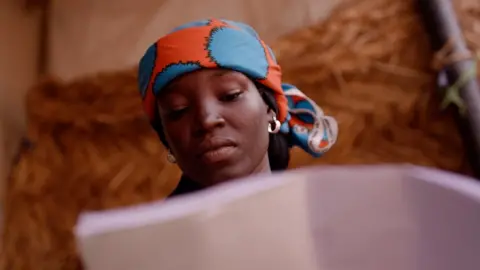 BBC/Simpa Samson. Amina has ambitions to be a journalist and help tell the story of the Chibok girls
BBC/Simpa Samson. Amina has ambitions to be a journalist and help tell the story of the Chibok girls
The grass is overgrown, the tiles on the walkways are new. The rust-coloured main gate has been moved and the dormitories do not exist any more. When the grounds were rebuilt, it reopened as a day school in 2021.
While the cosmetic changes to the school are significant, outside the gates little has changed in Chibok.
Insecurity is still rife. Boko Haram gunmen continue to attack the area, the latest assault late last year.
The poorly maintained roads are dotted with checkpoints and there is a heavy military presence in the town. Mobile communication is patchy, a telecom mast lies on its side next to the road, probably felled by militants, a local colleague says.
Then there are the emotional scars.
Amina spent two years as a hostage in Sambisa.
Like many of the captives, she was forced to "marry" a militant and convert to Islam.
There was a routine to life in the forest; cooking, cleaning, learning the Quran, but Amina never gave up hope that one day she would escape.
"I just thought even if I spend 10 years [as a hostage], one day I will escape," she says.
And one day she did.
It took weeks of trekking through thick bush in sweltering temperatures, little food and with her two-month-old baby strapped to her back, but she made it.
But more than 90 girls are still missing.
Her friend Helen Nglada is one of them.
Amina and Helen were classmates. They were both singers in the church band that Helen led.
After the kidnap, the two grew close in Sambisa forest, spending as much time as they could together. The last conversation Amina had with Helen was about Chibok and how much they wished they could go back there.
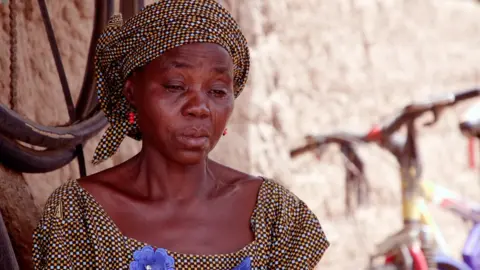 BBC/Simpa SamsonFor Helen's mother, Saratu, meeting Amina brings back painful memories
BBC/Simpa SamsonFor Helen's mother, Saratu, meeting Amina brings back painful memories
The agony caused by Helen's continued absence is etched on the faces of her parents, Saratu and Ibrahim, who are sitting outside their modest home, a short distance from the school.
Her mother tightly grips two photographs of Helen and her sister. The girls are wearing matching outfits, headscarves and serious expressions.
"I just wish I got my friend back," Amina says, "so we can share the happiness with her."
Saratu struggles to contain her emotions.
"Any time you come to the house and I see you, my mind goes back to my daughter," she says to Amina.
She breaks down into floods of tears and Amina places a hand on her shoulder to comfort her.
"I just want our [state] governor to do something and rescue our children," Ibrahim says quietly. "He should put in more effort to rescue the other children."

Amina's escape in 2016 was accompanied by huge fanfare and relief.
After being debriefed by the military, she met government officials including then President Muhammadu Buhari, who said the course of her life would change for the better.
"[The president said] he's going to take care of us and send us to school and even our children too," Amina recalls.
"Because it's not our fault to find ourselves in that situation and the children too, they don't know anything. They're innocent. So he's going to take care of them."
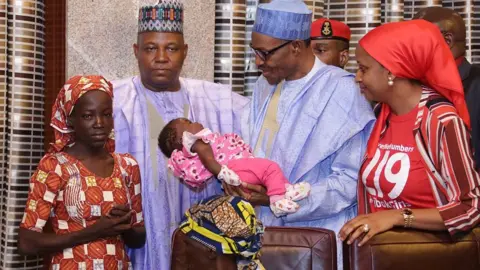 AFP. When she escaped from Boko Haram in 2016, Amina (L) and her baby met then President Muhammadu Buhari
AFP. When she escaped from Boko Haram in 2016, Amina (L) and her baby met then President Muhammadu Buhari
Life today does not look like what was promised.
Amina now lives in Yola, about five hours away from Chibok by road, and shares a small room with her daughter. They share an outdoor bathroom with a neighbour and she cooks on firewood outside.
Money is tight.
She receives 20,000 naira ($15; £12) a month to cover everyday expenses but nothing for her daughter's education, despite the government's promises. She pays that bill herself with the little money she makes from farming.
"It's hard for me to look after my daughter," she says. "What can I do? I have to do it because I don't have anyone."
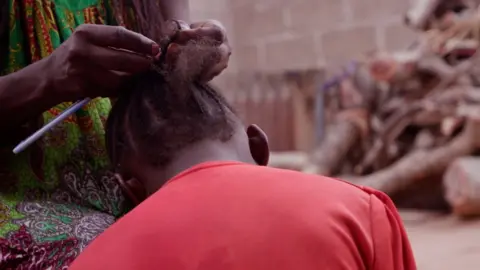 BBC/Simpa Samson. Amina struggles with the money she has to bring up her daughter who was born in a Boko Haram camp
BBC/Simpa Samson. Amina struggles with the money she has to bring up her daughter who was born in a Boko Haram camp
Amina is balancing raising her daughter while studying at the American University of Nigeria (AUN), a private and elite institution.
AUN is the only option Amina and the other Chibok girls were given to resume their studies, but many of them have struggled to keep up and some have dropped out.
"We didn't choose AUN because we know the school standards are difficult for us, we girls come from poor backgrounds," she says. "The former minister forced us to come to this school."
The girls said they would have liked more autonomy in choosing where they could study and wonder if some of the government's money spent covering the AUN's high fees could have been better spent directly supporting them.
Amina has attended AUN since 2017, but is not close to graduating. Only one of the former captives has graduated.
Nigeria's Women's Affairs Minister Uju Kennedy-Ohanenye says the government has been paying AUN roughly $350,000 a year for the Chibok girls and their education over the last six years.
It is an arrangement she says will be reviewed.
"I'm not paying nobody that kind of money. Even if they put it on the budget, I will not release the money," she says.
"The girls should be considered first and foremost. School is important, first and foremost. But you don't go to school on an empty stomach."

Rakiya Gali is another Chibok girl - she escaped from Boko Haram in 2017. She was a student at AUN briefly, but dropped out due to poor health.
Rakiya says she does not receive any financial support and like Amina pays for her son's education with the money she makes from farming, despite promises from the government.
"The government has been unfair to us," she says in an impassioned voice. "They knew that we went into [Sambisa forest] and came back with children. If they cannot help us, then who will help us?"
In addition to the financial burden, Rakiya lives in fear, as her town is still being attacked by Boko Haram. She says militants recently burned down her son's school.
"Whenever I hear any sound, I think it is a gunshot," she says.
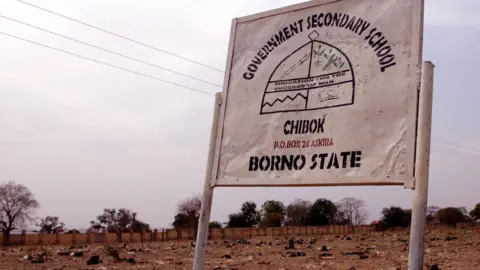 The school still exists - though it no longer takes boarders. BBC/Simpa Samson
The school still exists - though it no longer takes boarders. BBC/Simpa Samson
Rakiya desperately wants to move forward with her life and secure the best possible education for her son, but the lack of support makes things feel impossible.
So much so, she believes the Chibok girls who remain hostages would stay with Boko Haram if they could see how she and those who escaped are living outside the camp.
"When [the girls] return [they] will come join us in this situation," she says.
"I would say it is better to stay [in Sambisa forest] with the child and the father will provide support, rather than going through this trouble."
The conditions she describes are a far cry from those of one of their former captors.
Muhammad Alli, a former Boko Haram fighter who was involved in the Chibok kidnapping, is now living in Maiduguri with his family - including eight children.
He was part of the militant group for 13 years and rose to the rank of commander, even forcefully "marrying" one of the Chibok girls.
"At the time I married them, I did not feel any guilt," he says. "But when I decided to surrender, I started to realise how awful they must have felt being forced to do these things."
Like thousands of other fighters, Muhammad was granted amnesty and completed the state government rehabilitation programme. He has a farm, but also works with the military to help rescue abducted girls.
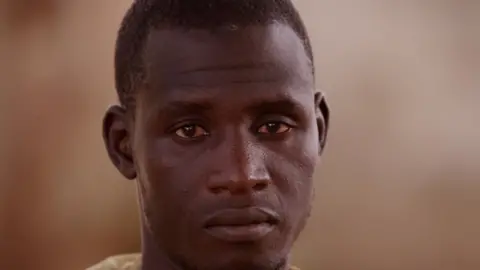 BBC/Simpa Samson. Muhammad Alli is now helping the authorities tackle other hostage situations
BBC/Simpa Samson. Muhammad Alli is now helping the authorities tackle other hostage situations
Last year he was part of a group that rescued some of the same people he had helped kidnap.
"They were in a terrible state when we found them," he says. "I cried at the sight of them."
The amnesty programme is not without controversy, with some saying that former militants like Mohammad should serve jail time and be held accountable for their numerous crimes.
"All I can say in that regard is to ask for forgiveness," Mohammed counters. "I am remorseful, I am looking for ways to quench the fire we started, and I do this with the men whom I surrendered with. We are doing our best to weaken the effects of insurgency."
But the insurgency rages on, and kidnapping for ransom has become even more widespread in Nigeria.
While reporting this story there were three separate kidnappings in north-eastern Nigeria, one of these attacks was on a school and was the largest of its kind since 2021.
Mohammad says that the "success" of the Chibok kidnappings has encouraged these types of attacks.
"We realised that the event shook the entire nation and Africa as a whole," he says. "And the core mission of Boko Haram for [group leader] Abubakar Shekau was to ensure our activities attracted attention.
"He also got money off some of these actions, which helped pay for transport and food, and that's why they continued the abductions."

Serious questions remain around Nigeria's military and its ability to tackle the insurgency that has spanned more than a decade and left hundreds of thousands of people dead, particularly as insecurity spreads to other parts of the country.
Gen Christopher Gwabin Musa, Nigeria's defence chief, has acknowledged the "enormous" challenges facing the military, calling the current state of insecurity in the country a "rude shock", but is confident the tide is turning.
As for the 91 Chibok girls still being held captive, Gen Musa says the military has not given up hope that they will be rescued.
Despite her satisfaction with her current situation, Amina is hopeful too.
She hopes to become a journalist one day, to be a voice for victims of kidnapping, to be a leader. She also hopes her daughter will finish her education and have a bright, safe future.
Most of all, she hopes her classmates will one day be freed.
"The only thing I need the government to do is to release some of my sisters that are still in captivity. I have that hope," she says.
"Because when they are still alive [there's hope] they will come back one day."
Latest Stories
-
Rafatu Inusah elected onto GOC Board
2 hours -
SAMSON’S TAKE: AG okays demo, how refreshing?
2 hours -
Trump questions Putin’s desire for peace after meeting Zelensky at the Vatican
3 hours -
Legend of The Week – George Darko
3 hours -
Kounde strike wins Copa del Rey final for Barcelona
8 hours -
Is NPP crying more than the bereaved in the Chief Justice saga?
10 hours -
“Elements within NPP worked against me for supporting ‘Ken must go'” – Cynthia Morrison
11 hours -
IMF Boss commends finance minister for strong commitment to economic reform
11 hours -
Cynthia Morrison advises Ghanaian women to diversify their skills to build wealth
11 hours -
UK deports 43 immigration offenders to Ghana and Nigeria
12 hours -
Piwak Natural Health urges Akosombo victims to rebuild with new donation
12 hours -
Ghana’s Para athlete Gilbert Ampiah wins bronze at Marrakech Grand Prix 2025
12 hours -
6 dead in Adansi Dompoase crash involving VIP bus and sprinter
12 hours -
Saturday’s heavy rainstorm caused outages within our network – ECG
13 hours -
Police arrest 3 over gold robbery at Wassa Afransie
14 hours

